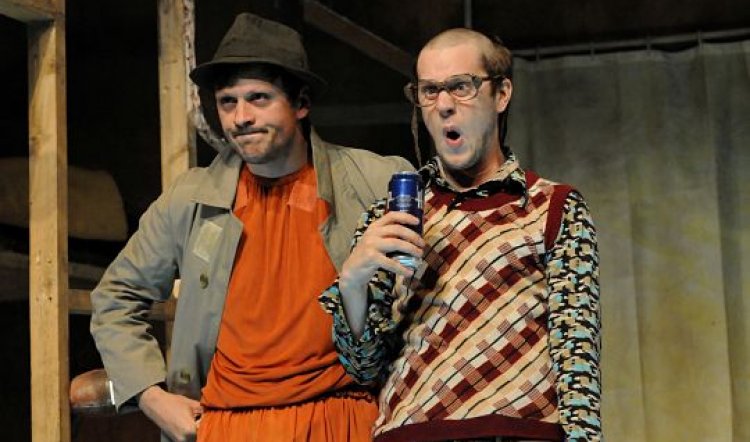
The walworth farce
ACOUSTICS are everything – give or take an actor or two – when it comes to a successful evening in the theatre. If you can’t hear the buggers, you might as well pull the plug and go home. This is what a number of patrons did at the interval on the opening night of The Walworth Farce, at the Sydney Theatre.
This has little to do with the actors, particularly Michael Glenn Murphy who plays Dinny, a bullying Da to Sean and Blake, and rarely delivers a line that’s not a full throated bellow. And as the downtrodden sons, neither Tadg Murphy nor Raymond Scannell are mumblers; while Mercy Ojelade, as Hayley, the young checkout chick catalyst for disaster is blessed with a fine voice and delivery. Why then did so many people, in various parts of the theatre, find it so hard to hear what was going on? According to actors familiar with the place, it’s the theatre itself that’s the problem and this isn’t the first production – particularly from a visiting company – that’s suffered similarly.
Unless the actors speak direct, out front, to the audience – fine if you’re doing some kind of declamatory melodrama, unsatisfactory otherwise – it’s guaranteed that an unfortunate proportion of paying customers will be straining to figure out what’s going on; to decipher any kind of accent and to attempt a sort of cryptic crossword catch up of clues and fragments. It could be seen happening all over the auditorium and, according to those upstairs, it was worse up there. And it’s a common complaint in the Sydney Theatre. Then there’s the play itself.
Enda Walsh’s The Walworth Farce, produced via the fabled Druid company, has been touring the international festival circuit since its first appearance and great success in Ireland in 2006. It arrives with box office gold and critical cred by the barrow-load. It has a rather stylish contemporary Irish basic black to it that, if you’re a Brit broadsheet critic, you can dress up or down with subliminal motivations, references to Josef Fritzl and comparisons such as that by one critic who wrote, “His work is a phantasmagorical synthesis of many influences – Joe Orton as well as Pinter, Eugene O'Neill as well as Brian Friel and Martin McDonagh.”
If that’s the case, I’ll have what he’s having.
Despite the unflagging energy and commitment of the cast – physical, emotional and vocal – The Walworth Farce left me numb with boredom. Another patron, who did not return after the interval, observed: “If I stayed for the second half I would have been two hours closer to death and I could have been doing something else.” On the other hand, three others leapt to their feet and ovated at the end, so there was a diversity of opinion, including several appreciative whistles and whoops amid polite applause.

What’s it all about? Dinny had left County Cork for south London some 20 years before under suspicious circumstances. That is, he didn’t just migrate to become a builder’s labourer as did so many thousands of Ireland’s poor and ill-educated. His two sons were sent to live with him and have grown up – if that’s the right description – in a squalid high-rise on the Walworth Road, an area of London that defies all attempts at gentrification.
Imprisoned on the 15th floor (lift broken) by virtue of being both stupid and bonkers, the three men re-enact incidents from long ago in a daily ritual that reeks of poverty and a poverty of imagination. It’s bleak and occasionally bleakly funny; elements of classic farce are mixed uneasily with familiar Irish themes of dysfunctional families, broken dreams and daily nightmares. (Why these should be peculiarly Irish is arguable unless it’s the strain of hopeless derangement that inhabits the genre.)
Director Mikel Murfi, set and costume designer Sabine Dargent and lighting designer Paul Keogan have created a plausible, tangible and almost smellable world in the crumbling ruin of the grim Council flat. While not realistic their work contains the truth that gives comedy and farce their anchoring logic; and highlights that particular shortcoming in the script. Orton and Pinter fasten the fantastic in solid ground, the better to make it take flight. McDonagh, O’Neill and Friel do similar things with the most grotesque or painful families. A joke is only as good as the seriousness with which it’s taken. And vice versa. Wigs or no wigs.



